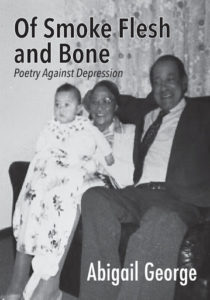Abigail George, when the word confronts the darkness of paranoia
Please help revise the jalapeños and Theodore Roethke
I live on a nowhere-island as if I am surrounded by velvet monkeys.
I try to monkey-eat understanding things, and monkey-work the stigma,
mentalism, matter out of my system, monkey-see my so-called mum
being her own person, loving us although we’re all fatally flawed beings.
Daughters, and husband. I know the world of self-delusion. Call it atypical
glory and intuition. I know the world of paranoia. I know it so well.
I’m feeling restless-panic. I think of my self-isolation. I’m lost inside
gravity, and the origins of theory in the womb ceremony of Roethke.
I’m lost in the attachment theory of the psyche and the learned kind
of helplessness of the intellect of my refrigerator mother and monkey-
life as they do. Woman in the system. Woman of the working classes
stop questioning your sanity, your memory, your perception of the
flow of the universe around you. Love only those who love you with
their entire being. Have no fear of the heights that you can break through
like vertigo. Remember your way, your path to enlightenment, your
errors. They have all been structural instructions to help you along
your sunned path. Understand havoc also had a dream once. Its goal
was to kill you inside. The depths of your moral fibre. Calmly distance
yourself from past hurts. Past regret. I manage my life now through
obsessive ritual and the undertaking of dissociations. Those monkeys
take poetic turns gaslighting me. I know there is a flux, an extreme power
imbalance. The absolute imbalance of absolute power. I discovered
psychology through my mental illness. My struggle. My innate struggle for
independence, emotional and financial security. The blooms there are a
trauma model of mental disorders. And all I can think of, dance to are
the words. Words like the boiling kettle of ‘causal role’, and dark side of
‘safety in family relationships’. All I can think of are the female victims,
mental cruelty, reconnecting with society and the community. But I
have come back from the mushrooms of the divided self. Its Walmart.
From the invisible self. From the self that cannot and does not want to
be named. Mozart is reading Emergency Continued. He tells me up there
he is well-acquainted with the South African educationalist Richard
Rive. Rive and Brink play chess, while discussing the Sylvia Plath effect (it’s
pretty common up there, and there is acute release in talking about it
in that community). They talk about mascots and symbols, dogs, cats
and contemporary composers on the post-apartheid landscape. In the
archives, Roethke will live forever. On the web, in Wikipedia, in media
the jalapeños are blue. The jalapeños are as blue as an Olympic-sized
swimming pool. Mozart knows why they call it jazz. At least I think so.
The inner self of the trees is green. The boiling fields are green. The
coming harvest though is yellow. My grandeur is figment and illusion, subject and
living object, and I try not to talk about the chapters of chronic maltreatment
in my childhood. I try to love. I do. I try to love the olive branch, but
it spits me out and rejects me. The green figs despise me because of my intellect.
The fact that I am a female reader. That Christ has left my fate in the
hands of the stars. The olives are cold, swimming in brine. They have
their song. They sing of liberty. The olives are feminists in their outlook. They
watch me through the glass bottle every time the door clicks open via a
thimble-crack. With glassy stares, they study and observe every move.
*******
[Courtesy of the author]
Link to the Italian translation
 Abigail George is a South-African feminist, poet and writer based in Port Elizabeth. Born in 1979, she is a prolific writer: she has written a novella, several books of poetry and a collections of short stories. She is a Pushcart Prize nominee and the recipient of two South African National Arts Council Writing Grants and of one from the Centre for the Book and the Eastern Cape Provincial Arts and Culture Council.
Abigail George is a South-African feminist, poet and writer based in Port Elizabeth. Born in 1979, she is a prolific writer: she has written a novella, several books of poetry and a collections of short stories. She is a Pushcart Prize nominee and the recipient of two South African National Arts Council Writing Grants and of one from the Centre for the Book and the Eastern Cape Provincial Arts and Culture Council.
This poem gathers the main themes of her poetics: a dreamlike atmosphere, a thick net of intertextual references, a multitude of voices. The author’s own thoughts are intertwined with the voices of artists from the past; and all together are counterbalanced by a vivid imagery made of colours and elements both familiar and highly symbolic as the olive branch and the green figs.
From this oneiric landscape composed of images and sounds that are real, fictional and echoing through the past all at the same time, the struggle for mental balance emerges in all its complexity. And also the struggle of a woman “for independence, emotional and financial security” that is the struggle of all women who don’t want to be “female victims“.
